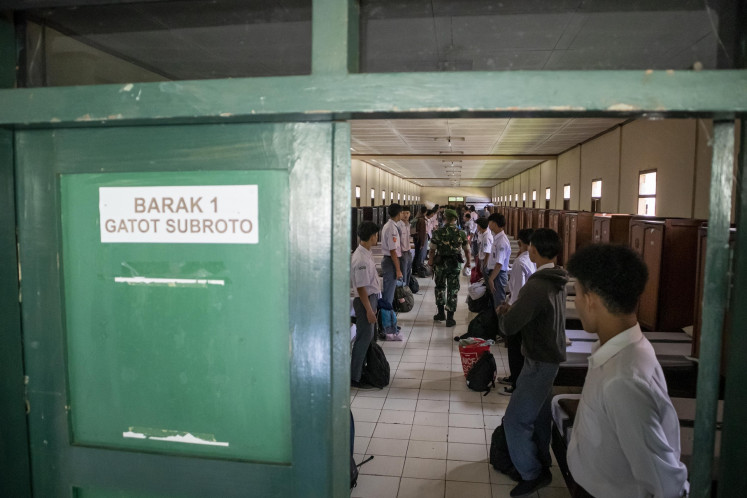Sleep calls: New virtual service offers listening ear
Change text size
Gift Premium Articles
to Anyone

A
part from offering a sense of comfort and companionship, sleep call services are emerging as a way for some to tackle sleeplessness and loneliness, though the practice's clinical benefits are as yet unproven.
Two individuals engage in a telephone conversation until one of them falls asleep. This is a “sleep call”, and while the practice usually occurs between people in a relationship, whether romantic, familial or just friends, some young entrepreneurs have started offering the service to virtual strangers.
Illala Ridya “Altha” Indriyani discovered that these kinds of calls were crucial for the quality of sleep she got and particularly in falling asleep easily, regardless of her relationship with the caller. Realizing that she was not alone, she opened a unique virtual service last year through the Instagram account, urvirtual.needs.
“Over the past two days, we received orders for up to 150 customers,” the Yogyakarta undergraduate student told The Jakarta Post in June.
“The user demographic ranges from 15 to 47 years old,” Altha said, adding that 70 percent of her customers were women, with many based in Jakarta, Yogyakarta and Semarang. “We have customers [in] Papua as well.”
Those figures remained steady, if not expanded, during the pandemic. “The pandemic brought us many customers, probably because they feel lonely,” she said.
Interestingly, the service has attracted not only people who are single, but also many customers who are currently in romantic relationships. Besides sleep calls, customers can also request a virtual partner for all-day conversations or online gaming sessions.
Altha suggests that her single customers likely sought the service “because they need a companion”, while those in a relationship might “need someone to talk to because they have [relationship] problems”.

‘Virtual partner’ only
Money was not the only factor that motivated Altha to open her sleep call service. Along the way, she also learned valuable lessons and gained various experience, from coordinating her team and managing her business’s finances to handling unexpected reactions from customers.
“I am happy to see my team being passionate about their work, so I also like to interact with people. I never even imagined that the [response] would be this huge. There are so many new things that I had never done before,” she said.
Altha does not make the one-on-one sleep calls to her customers. Instead, she hires external “talents” who provide the service as a customer’s “virtual partner”.
“The funniest thing is, when the customers [become] attached to one of the talents, they usually vent to me.”
As part of her strategy to maintain loyalty, Altha always lets the customer choose their talent. In cases when the preferred talent is unavailable at a particular time, Altha recommends alternatives.
“There are several customers who always make appointments with the same talent,” she noted, whether they missed talking with that talent or “just wanted someone to talk to”.
Due to the intimate nature of engaging in a conversation to fall asleep, it is no wonder that some customers have wanted to pursue real-life relationships with a talent outside the service. Altha has a strict policy on this that she imposes through technology.
“After the service is delivered, the number will be blocked and deleted, along with the chat history. We never use [the talent’s] real identity to minimize any unwanted action,” she said.
Ryu (not his real name), a 20-year-old in Semarang, provides a similar service for free. “I provide the service [for] women who can't sleep,” said Ryu, who also uses social media to market his service.
He added that in the beginning, he was confused at what to talk about, “so I just talked about anything”, and that he was fine with not being paid to provide the service.

Misconceptions & stigma
Despite their intention to help people who needed someone to talk to or to just listen, some people had negative perceptions about sleep call services, while some customers tried to push beyond the service’s privacy policies.
“There have also been several comments on social media [by users] thinking this service had a negative purpose,” said Altha, clarifying that such comments usually drew on a misconception that the service was of a sexual nature.
“I hope that in the future, people will realize that this service is [...] for people who want to talk, but don’t have anyone to share with. Hopefully, the services we provide will help many more people,” she added.
Altha admitted, however, that she frequently received requests from customers who wanted more than a voice call: They wanted a video call.
“That’s not allowed,” she underlined, as her service was firmly rooted in guaranteeing privacy and safety, for both the customer and the talent.
Ryu, on the other hand, does receive requests for more intimate sleep calls, but he says this is not a problem for him as an independent provider.
“I cannot speak in detail about it, that [has to do with] someone’s privacy, but yes, I’ve had several sleep call requests like that.”
Flora (not her real name), who started using Altha’s sleep call service out of curiosity, said her need for companionship remained her main reason for continuing to use the service.
“I think this is quite taboo for some [people] in Indonesia. But the purpose of a sleep call [service] here is to create an ecosystem for people who need friends to chat with,” she said.
Despite the service’s rapid growth, experts are skeptical that sleep calls are a panacea for sleep disorders.
“Many things can be a cause of sleeplessness, from physical activity and habits to certain psychological conditions,” said psychologist Azizatul Adni at Bale Psikolog, a counseling service in East Lombok.
He added that a variety of treatments were available to address sleep disorders, but “there are no research results that support the argument that sleep calls can [treat] sleep disorders”.
“Psychologically speaking, there is no literature that explains in detail the impacts of sleep calls on a person’s psychological condition,” said Adni
Due to the lack of research focusing on the clinical benefits of sleep calls, Adni said that as a professional psychologist, he could not recommend the service for people who had problems sleeping. He conceded, however, that he had not treated any patient who had tried sleep calls as a therapeutic method for more than five years.
“Until now, no specific attention has been made in relation to the sleep call phenomenon,” he said.









